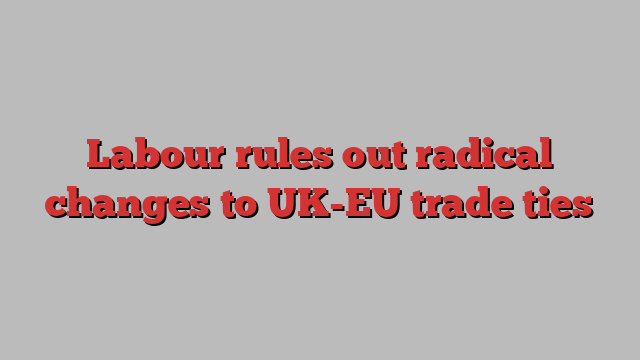
A Labour government would not take radical steps to improve the UK’s trade ties with the EU because reopening political arguments over Brexit will send the wrong message to overseas investors, its shadow business secretary has said.
Jonathan Reynolds said on Thursday that delivering “stability” was Labour’s overwhelming priority if it won the election next week after the head of the UK’s largest business group called on politicians to stop “walking on eggshells” over the impact of Brexit.
While acknowledging that the trade barriers created by Brexit had been “really, really difficult”, Reynolds told the British Chambers of Commerce’s annual international conference that the lack of consensus over Brexit limited the party’s ambitions.
“Labour will not be seeking to rejoin the single market or the customs union, or to reopen the wounds of the past, because that would not give us the stability which we know is essential,” he said, adding that the party would “take a grown-up approach to Brexit”.
In their general election manifestos, UK business groups, such as the BCC, the CBI and MakeUK, the manufacturers’ group, have asked the next government to take steps to reduce the costs of Brexit for their members.
Recommended measures include striking a UK-EU youth mobility accord to enable young people to live and work in each other’s countries.
Labour has already repeatedly ruled out such a deal, saying it will not do anything that looks like a return to free movement of people — a core principle of the bloc that gives unlimited rights to work, study and travel.
Instead the main opposition party, which is on track to secure a large majority on July 4, according to opinion polls, has limited itself to a deal that will reduce red tape for touring musicians, who have been badly hit by Brexit.
Asked whether Labour would consider a more limited type of youth mobility deal — of the kind that the UK has already signed with countries such as Australia, Canada and Japan — Reynolds said any negotiation with the EU needed to be considered “in the round”.
The EU-UK Trade and Cooperation Agreement that was brokered by then prime minister Boris Johnson is due for a five-year review in 2026, which will give the UK an opportunity to improve its terms.
Reynolds said that after a decade of political turmoil that had damaged Britain as a destination for foreign investors, the top request of UK plc was “stability”.
The key metric of success for a Labour government, he added, would be ensuring the UK rose up the G7 league table for business investment.
Business investment has stagnated since Brexit, and the number of foreign direct investment projects landing in the UK fell to a near 12-year low in the fiscal year to March 2024, according to official figures released on Thursday.
Reynolds said domestic policy priorities included removing obstacles to house building and other projects via planning reform. Better relations with the EU were needed but “the growth can only come from a more stable position in the UK”, he added.
As an example of what could be achieved within Labour’s red lines, Reynolds cited a “New Zealand-style” veterinary accord to reduce border red tape on food and plant exports.
Trade experts have said this kind of deal would limit the frequency of checks and paperwork but not remove them.
David Henig, UK director at the European Centre for International Political Economy, a think-tank, said any such accord would take time to negotiate given the EU’s high sensitivity about food imports and standards.
Meanwhile, Prime Minister Rishi Sunak doubled down on his advocacy of Brexit, saying on an election campaign visit to Derbyshire that he was “proud” of his decision to back Leave in the 2016 referendum.
He said Labour leader Sir Keir Starmer wanted to reverse Brexit and that was “completely wrong”.
In his final televised election debate with Sunak on Wednesday, Starmer ruled out accepting higher migration as part of his plan to improve the trade deal.
Additional reporting by George Parker in Derbyshire